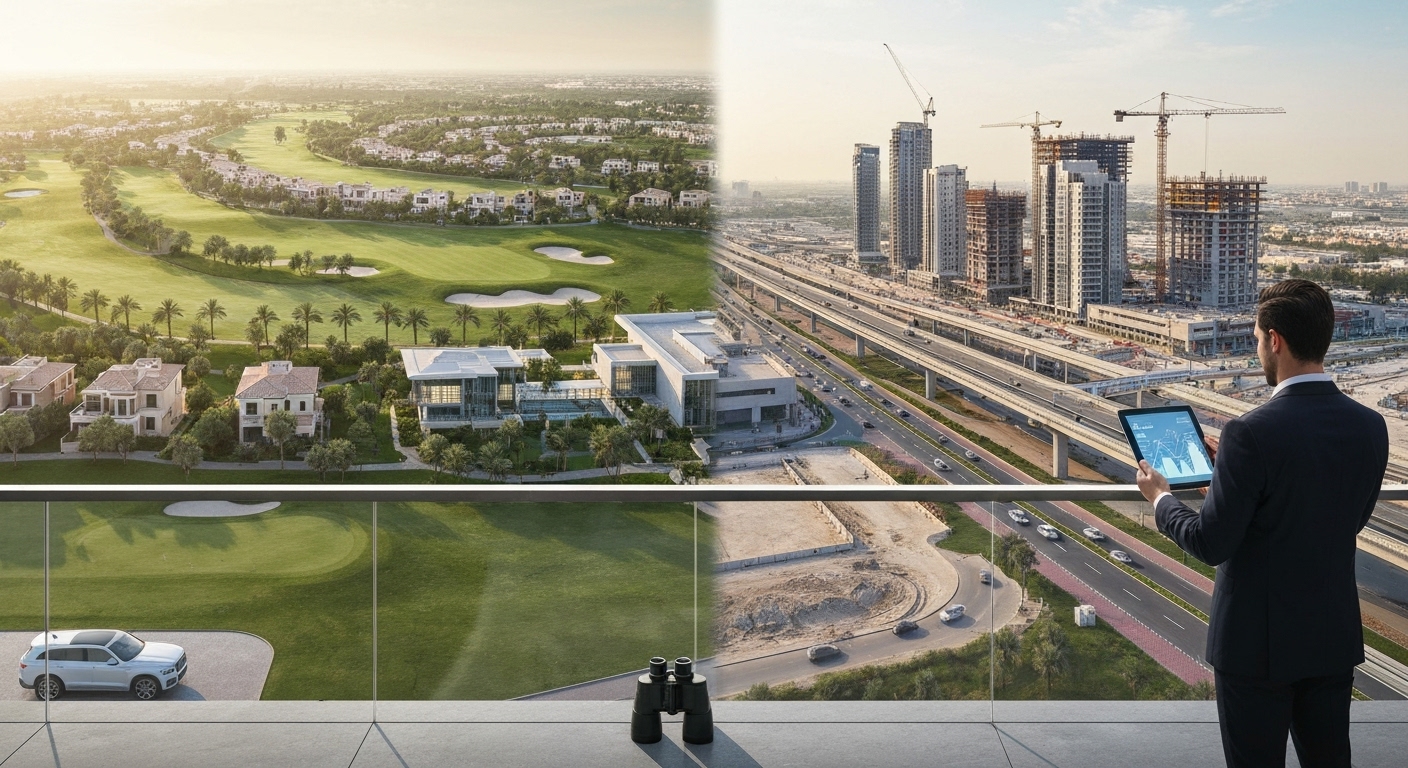Dubai’s real estate landscape stands at the crossroads of tradition and transformation. For international High-Net-Worth Individuals (HNIs), investment decisions go far beyond acquiring a luxury second home—they’re strategic moves to preserve, appreciate, and diversify wealth. But with Dubai Hills Estate established as a premium address, and a host of emerging districts promising superior growth, which path offers the best blend of capital appreciation and stability in 2025? Let’s delve into a comprehensive, investor-focused analysis.
The Allure of Dubai for HNI Real Estate Investors: Beyond Lifestyle
Dubai’s appeal for global investors is built on more than skyline spectacle or cosmopolitan living. The city differentiates itself with:
- Robust asset security: Strong governance and transparent regulations underpin investor confidence.
- Market diversity: From ultra-luxury to accessible premium segments, Dubai’s portfolio uniquely accommodates various investment appetites.
- Liberalised visa and residency schemes: Attractive long-term residency options create real value for international buyers and their families.
- Stable yet dynamic returns: According to Cavendish Maxwell’s H1 2025 market report, Dubai’s status as a global financial hub delivers both dependable rental yields and substantial appreciation prospects[1].
This fertile environment has proven especially appealing to HNIs seeking not only lifestyle upgrades, but tangible long-term returns and security.
Dubai Hills Estate: A Deep Dive into its Capital Appreciation Trajectory
Dubai Hills Estate has evolved into an address synonymous with prestige, wellness, and exclusivity. Noteworthy aspects for investors include:
- Proven appreciation: According to DXB Interact data cited in a market review, Dubai Hills Estate saw transaction volumes surge from 982 deals in 2020 to 7,081 in 2024, with sales value reaching 20.3 billion AED, underlining its consistent outperformance among mainstream districts[2].
- Integrated community living: Residents benefit from top-tier schools, world-class golf courses, healthcare, and seamless retail access.
- Strong rental demand: Expat executives and families fuel stable occupancy and steady cash flow.
- Mature infrastructure: Reliable roads, green spaces, and leisure amenities translate into enduring appeal.
While Dubai Hills Estate’s capital appreciation has stabilized at a steady, high-value pace, finding entry points at competitive prices is becoming increasingly challenging due to established demand. For broader market context, see Dubai’s Real Estate Forecast: What the Next 5 Years Look Like.
Identifying Dubai’s Emerging Areas with High Capital Growth Potential
2025 is forecasted to be the year where new investment corridors truly come of age in Dubai. Based on Danube Properties’ market intelligence, these segments stand out:
- Emerging Corridors: Areas benefiting from new infrastructure projects—think arterial highways, business zones, and proximity to Expo City.
- Waterfront Developments: Coastal neighborhoods continue to command a premium due to limited supply and lifestyle draw.
- Mixed-Use Communities: Integrated projects that blend residential, retail, and leisure are shaping future preferences.
- Branded Residences: Properties associated with luxury brands and hotel operators offer both prestige and price resilience.
Danube Properties, with its focus on timely delivery and innovation, is frequently at the forefront of these growth pockets, supplying market-responsive, accessible luxury options tailored to both HNIs and upwardly mobile international investors. For off-plan opportunities in Dubai, see Off-Plan Apartments in Dubai: A Golden Opportunity for Indian Investors.
Comparative Analysis: Dubai Hills Estate vs. Emerging Hotspots for HNIs
Dubai Hills Estate
- Strengths: Asset security, established infrastructure, steady rental yields, prestigious postcode.
- Limitations: Entry costs have appreciated, scope for value jumps is moderating as the area matures.
Emerging Areas
- Strengths: Lower entry prices, according to Cavendish Maxwell’s H1 2025 report, several new communities—including Dubai Hills Estate—posted double-digit price growth, confirming the potential for outsized capital appreciation in newer districts[1].
- Limitations: Some areas present infrastructural or occupancy risks until fully established, requiring due diligence and a longer investment horizon.
Astute HNIs are increasingly considering a two-pronged strategy—preserving capital in mature zones like Dubai Hills while selectively targeting higher-growth districts for outsized returns.
For metro-connected opportunities, see Can You Own Property Near the Metro in Dubai?
Key Factors Driving Capital Appreciation in Dubai’s Luxury Market
Several structural drivers empower Dubai’s real estate performance:
- Supply constraints in premium zones: Areas with finite land see values rise as demand intensifies.
- Regulatory reforms: Streamlined property ownership, foreign investment policies, and visa incentives foster liquidity and FDI.
- Brand partnerships and amenities: Developments featuring global brands, smart technology, and luxury amenities command higher long-term appreciation.
- Economic diversification: Dubai’s ongoing push in tourism, finance, and tech underpins sustained demand for premium real estate.
These factors manifest not only in established areas like Dubai Hills Estate, but also in new districts that integrate similar principles with greater upside.
For top areas for investment, see Top Areas for Property Investment in Dubai: High Rental Yields and Lifestyle.
Mitigating Risks and Maximizing Returns for HNI Investors in Dubai
Risk management is integral for international HNIs navigating both established and new markets:
- Due diligence: Partnering with reputable, transparent developers is critical—Danube Properties is renowned for timely completion and customer-centric service.
- Diversified allocation: Blending investments between mature and emerging zones hedges against volatility while capitalizing on growth.
- Long-term perspective: Wealth preservation and multi-generational planning favor Dubai’s robust, regulatory-driven market appreciation over short-term speculation.
Danube Properties’ Strategic Vision in Dubai Hills and Emerging Markets
As a pioneering developer, Danube Properties enables HNIs to tap into Dubai’s promise for capital appreciation:
- Track record: Delivery of high-quality projects in both established and high-growth corridors.
- Investor-centric approach: Innovative payment plans and market-responsive designs to maximize access and appeal.
- Growth alignment: Strategic landbanking and launches in infrastructure-led districts, maximizing investor returns.
- Global trust: Proven appeal to international buyers from India, Europe, and beyond by providing asset security and transparent transactions.
In conclusion: Dubai Hills Estate remains a gold standard for long-term wealth preservation, but the smart HNI investor looks to emerging areas—guided by reliable brands like Danube Properties—for accelerated capital appreciation and next-generation investment success. In 2025 and beyond, diversification within Dubai’s evolving luxury map is the cornerstone of prudent, profitable HNI real estate strategy.




